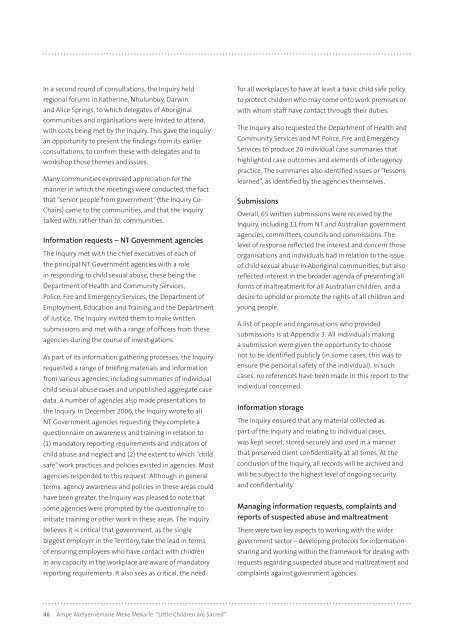bipacsa_final_report
bipacsa_final_report
bipacsa_final_report
You also want an ePaper? Increase the reach of your titles
YUMPU automatically turns print PDFs into web optimized ePapers that Google loves.
In a second round of consultations, the Inquiry held<br />
regional forums in Katherine, Nhulunbuy, Darwin<br />
and Alice Springs, to which delegates of Aboriginal<br />
communities and organisations were invited to attend,<br />
with costs being met by the Inquiry. This gave the Inquiry<br />
an opportunity to present the findings from its earlier<br />
consultations, to confirm these with delegates and to<br />
workshop those themes and issues.<br />
Many communities expressed appreciation for the<br />
manner in which the meetings were conducted, the fact<br />
that “senior people from government” (the Inquiry Co-<br />
Chairs) came to the communities, and that the Inquiry<br />
talked with, rather than to, communities.<br />
Information requests – NT Government agencies<br />
The Inquiry met with the chief executives of each of<br />
the principal NT Government agencies with a role<br />
in responding to child sexual abuse, these being the<br />
Department of Health and Community Services,<br />
Police, Fire and Emergency Services, the Department of<br />
Employment, Education and Training and the Department<br />
of Justice. The Inquiry invited them to make written<br />
submissions and met with a range of officers from these<br />
agencies during the course of investigations.<br />
As part of its information gathering processes, the Inquiry<br />
requested a range of briefing materials and information<br />
from various agencies, including summaries of individual<br />
child sexual abuse cases and unpublished aggregate case<br />
data. A number of agencies also made presentations to<br />
the Inquiry. In December 2006, the Inquiry wrote to all<br />
NT Government agencies requesting they complete a<br />
questionnaire on awareness and training in relation to<br />
(1) mandatory <strong>report</strong>ing requirements and indicators of<br />
child abuse and neglect and (2) the extent to which “child<br />
safe” work practices and policies existed in agencies. Most<br />
agencies responded to this request. Although in general<br />
terms, agency awareness and policies in these areas could<br />
have been greater, the Inquiry was pleased to note that<br />
some agencies were prompted by the questionnaire to<br />
initiate training or other work in these areas. The Inquiry<br />
believes it is critical that government, as the single<br />
biggest employer in the Territory, take the lead in terms<br />
of ensuring employees who have contact with children<br />
in any capacity in the workplace are aware of mandatory<br />
<strong>report</strong>ing requirements. It also sees as critical, the need<br />
Ampe Akelyernemane Meke Mekarle “Little Children are Sacred”<br />
for all workplaces to have at least a basic child safe policy<br />
to protect children who may come onto work premises or<br />
with whom staff have contact through their duties.<br />
The Inquiry also requested the Department of Health and<br />
Community Services and NT Police, Fire and Emergency<br />
Services to produce 20 individual case summaries that<br />
highlighted case outcomes and elements of interagency<br />
practice. The summaries also identified issues or “lessons<br />
learned”, as identified by the agencies themselves.<br />
Submissions<br />
Overall, 65 written submissions were received by the<br />
Inquiry, including 11 from NT and Australian government<br />
agencies, committees, councils and commissions. The<br />
level of response reflected the interest and concern those<br />
organisations and individuals had in relation to the issue<br />
of child sexual abuse in Aboriginal communities, but also<br />
reflected interest in the broader agenda of preventing all<br />
forms of maltreatment for all Australian children, and a<br />
desire to uphold or promote the rights of all children and<br />
young people.<br />
A list of people and organisations who provided<br />
submissions is at Appendix 3. All individuals making<br />
a submission were given the opportunity to choose<br />
not to be identified publicly (in some cases, this was to<br />
ensure the personal safety of the individual). In such<br />
cases, no references have been made in this <strong>report</strong> to the<br />
individual concerned.<br />
Information storage<br />
The Inquiry ensured that any material collected as<br />
part of the Inquiry and relating to individual cases,<br />
was kept secret, stored securely and used in a manner<br />
that preserved client confidentiality at all times. At the<br />
conclusion of the Inquiry, all records will be archived and<br />
will be subject to the highest level of ongoing security<br />
and confidentiality.<br />
Managing information requests, complaints and<br />
<strong>report</strong>s of suspected abuse and maltreatment<br />
There were two key aspects to working with the wider<br />
government sector – developing protocols for information-<br />
sharing and working within the framework for dealing with<br />
requests regarding suspected abuse and maltreatment and<br />
complaints against government agencies.


